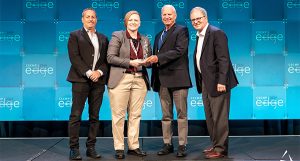 Washington, D.C. – U.S. News & World Report and Best Lawyers, for the 11th consecutive year, collaboratively announce the release of the “Best Law Firms” rankings. The Kim & Lahey Law Firm has been recognized for this honor three times since it was founded in 2018.
Washington, D.C. – U.S. News & World Report and Best Lawyers, for the 11th consecutive year, collaboratively announce the release of the “Best Law Firms” rankings. The Kim & Lahey Law Firm has been recognized for this honor three times since it was founded in 2018.

Patent Attorney Robert Merting joins Kim, Lahey & Killough Law Firm
 Kim, Lahey & Killough Law Firm is pleased to announce the addition of Robert Merting as an attorney in the firm’s Greenville, SC, office. Mr. Merting’s primary focus will be the firm’s intellectual property practice, corporate law, and regulatory compliance. He will also provide legal services directed to patent application preparation, contract and licenses, trademarks, non-disclosure agreements, and litigation.
Kim, Lahey & Killough Law Firm is pleased to announce the addition of Robert Merting as an attorney in the firm’s Greenville, SC, office. Mr. Merting’s primary focus will be the firm’s intellectual property practice, corporate law, and regulatory compliance. He will also provide legal services directed to patent application preparation, contract and licenses, trademarks, non-disclosure agreements, and litigation.
A native of South Carolina, Mr. Merting worked in the research lab at Milliken and Company while attending Wofford College. It was at Milliken and Company that he gained a deep understanding of the creation process while working in research and development, following strict corporate guidelines for developing and documenting intellectual property. “Today, I leverage the lessons from those R&D challenges while helping clients document and protect their own intellectual property. It is always a joy telling a client their patent will issue,” says Merting.
In addition to his intellectual property practice, Mr. Merting brings more than ten years of legal experience in the areas of corporate law, wills and trusts, estate planning, and firearms law. “We welcome Robert and are delighted to have him at Kim, Lahey & Killough,” commented founding attorney Doug Kim. “Our firm has doubled in size this past year as we grow to meet the legal needs of South Carolina businesses. Robert brings a unique skillset to our firm by combining his business experience while working at a major Upstate manufacturing company, his in-house counsel experience with a Department of Defense contractor, and his private practice experience to assist us in continuing to provide excellent legal services to our clients and meet their growing needs.”
Robert Merting earned a Bachelor of Science in computer science, a Bachelor of Arts in business economics from Wofford College, and his Juris Doctor from Washington and Lee University. He is admitted to practice before all South Carolina Courts, the South Carolina Supreme Court, the United States District Court for the District of South Carolina, and the United States Patent and Trademark Office.
With offices in Greenville and Charleston, SC, and Brevard, NC, the Kim, Lahey & Killough Law Firm is devoted to helping clients establish, enforce, and leverage their intellectual property rights from the Upstate to the Lowcountry and across the globe.
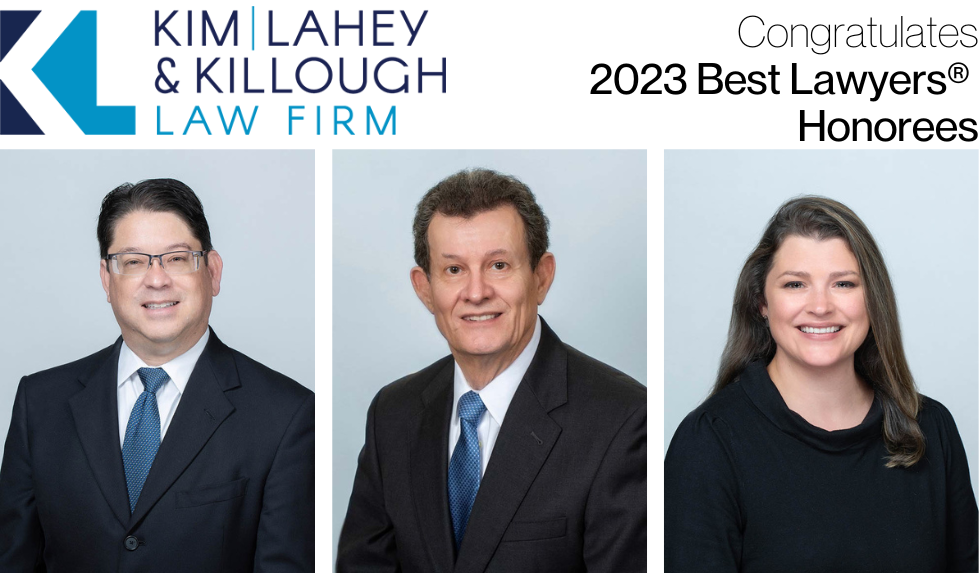
Kim, Lahey & Killough attorneys recognized by Best Lawyers®
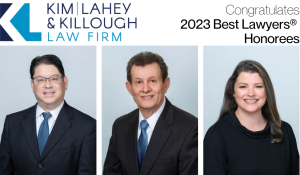 The Kim, Lahey & Killough Law Firm is pleased to announce several of its attorneys are recognized by Best Lawyers® for 2023.
The Kim, Lahey & Killough Law Firm is pleased to announce several of its attorneys are recognized by Best Lawyers® for 2023.
Founding member, Doug Kim, is recognized in the 29th edition of The Best Lawyers in America® in the practice areas of patent law and trademark law. He has been recognized in both areas previously as Greenville’s Trademark Lawyer of the Year, 2022, and Patent Lawyer of the Year, 2019. This is the eighth time he has been recognized by Best Lawyers.
In our Charleston office, B.C. Killough is also listed in The Best Lawyers in America in the practice areas of patent law and trademark law, as well as corporate law and intellectual property litigation. Killough has been recognized annually in Best Lawyers since 2010 for his work in these areas. In 2015, he was listed as The Corporate Law Lawyer of the Year for the Charleston metro.
Attorney Casey Martin is named in Best Lawyers: Ones to Watch in America™ in the practice areas of employment law for employees, employment law for managers, and employment law litigation. This recognition highlights the legal talent of lawyers who have been in practice for less than 10 years.
The Best Lawyers in America recognizes only the top 5.3% of elite lawyers in the nation across 150 practice areas. More than 12 million evaluations were considered in this purely peer-review to identify this year’s exclusive group of Best Lawyers honorees.
With offices in Greenville and Charleston, SC, and Brevard, NC, the Kim, Lahey & Killough Law Firm is devoted to helping clients establish, enforce, and leverage their intellectual property rights from the Upstate, to the Lowcountry to across the globe.
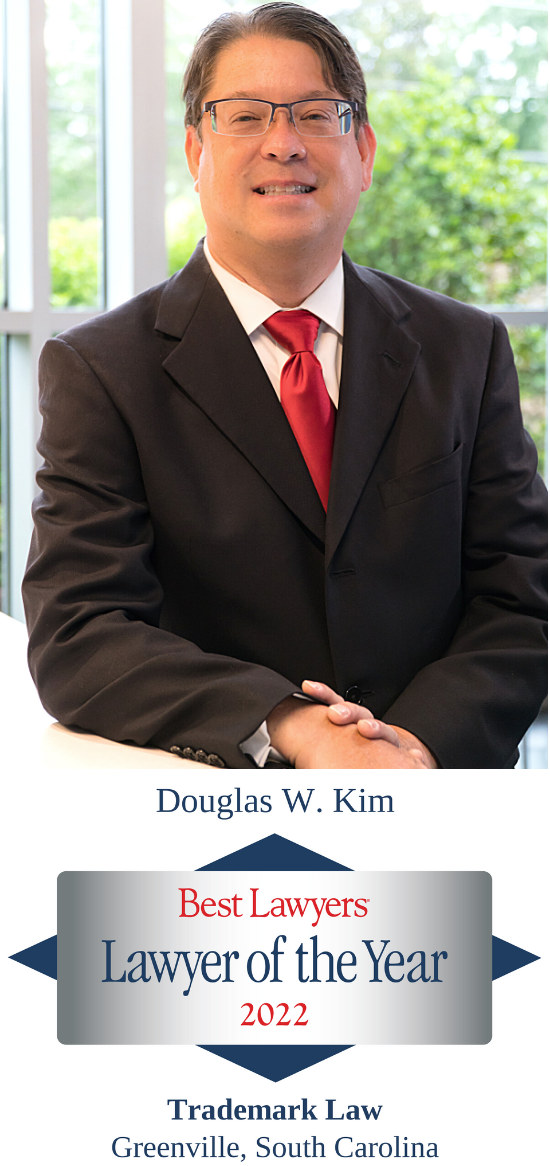
Doug Kim named Best Lawyers® 2022 Trademark “Lawyer of The Year” in Greenville
Greenville, S.C. — August 19, 2021— A founding member of the Kim & Lahey Law Firm is named Best Lawyers® 2022 Trademark “Lawyer of The Year” in Greenville. This is the seventh time Douglas Kim has been recognized by Best Lawyers. The long-time intellectual property attorney says, “I am honored to have been selected for this ‘Lawyer of the Year’ award especially since it’s determined by peer reviews.”
The 2022 edition of The Best Lawyers in America recognizes the professional excellence of more than 66,000 lawyers in 147 practice areas. “Lawyer of the Year” honors are awarded to only one lawyer per practice area in each region with extremely high overall feedback from their peers, making it an exceptional distinguishment. Of all the attorneys in private practice in the United States, only 5% are recognized by Best Lawyers of America.
This is the second time Doug has received this top honor. In 2019, Doug was named Best Lawyers® Patent “Lawyer of The Year” in Greenville.
Doug is an innovation enthusiast, entrepreneur and long-time business advocate who enjoys providing legal solutions and strategies tailored to each client’s goals, from start-ups to multinational corporations. Doug helps clients match their intellectual property goals with their business goals by providing legal strategies to protect inventions (patents), brands (trademarks), websites, software, apps, music, photos, and websites (copyright, licenses and Internet law), and trade secrets. Doug also chairs the South Carolina Bar Intellectual Property and Innovation Committee.
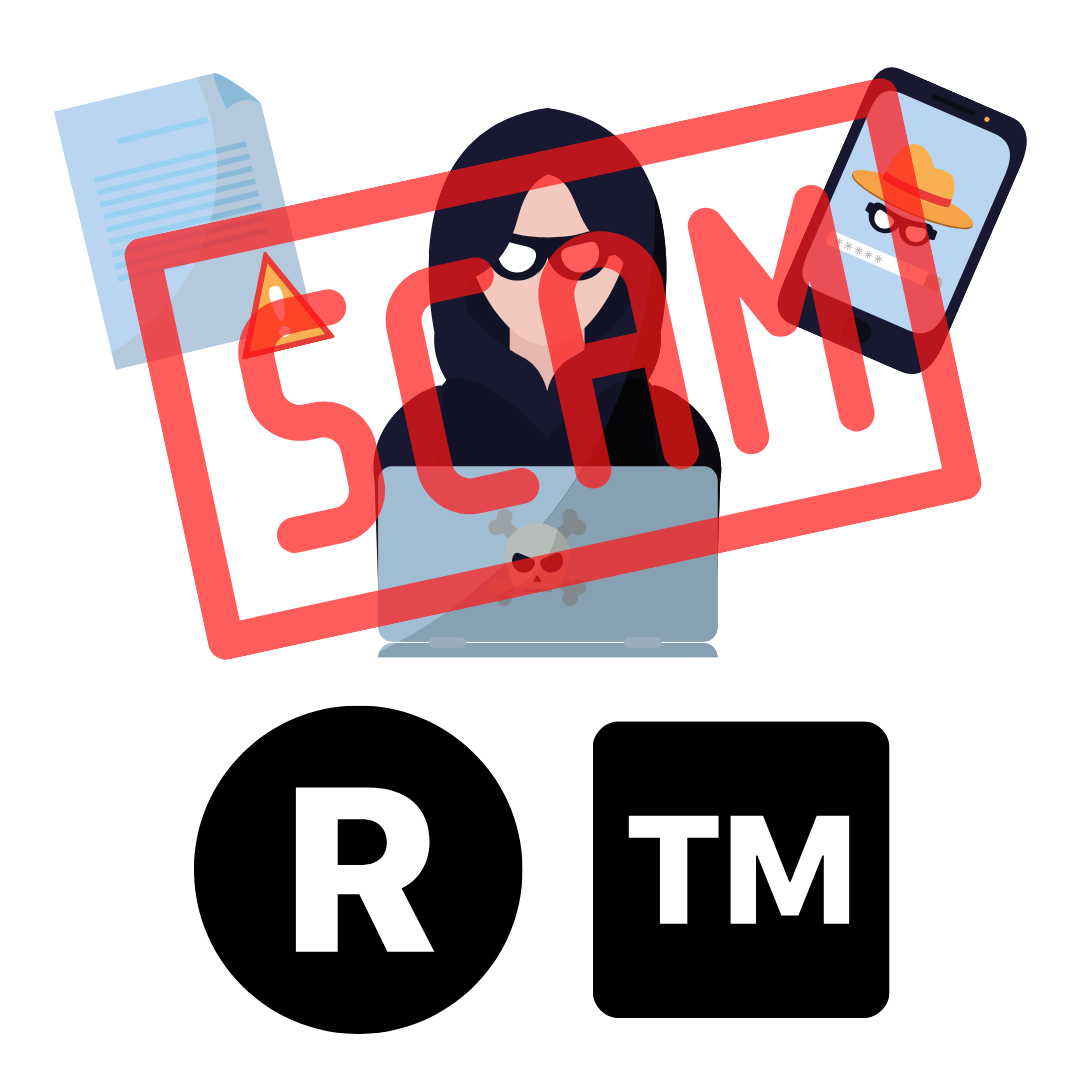
Trademark Renewal Scams: A Growing Problem. Don’t be Fooled.
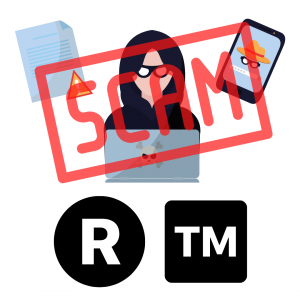 Anyone who has registered or applied for a trademark knows it eventually must be renewed. Unfortunately, bad actors know this too and are trying to rip you off. According to the US Patent and Trademark Office (USPTO), trademark renewal scams are on the rise. They’re becoming so sophisticated that the USPTO has filed several trademark applications to increase protection for its own brand.
Anyone who has registered or applied for a trademark knows it eventually must be renewed. Unfortunately, bad actors know this too and are trying to rip you off. According to the US Patent and Trademark Office (USPTO), trademark renewal scams are on the rise. They’re becoming so sophisticated that the USPTO has filed several trademark applications to increase protection for its own brand.
Being on a national trademark register is one of the many benefits of have a federally registered trademark. It allows others to search and find your registration. When other companies are trying to determine if a name is “available,” one of the first places they look is the USPTO database of trademark registrations and pending applications. To keep a trademark registration enforceable, it must be renewed periodically. Generally, the first renewal is five years from registration. The next one in five more years and then every 10 years after that. Unfortunately, bad actors are also looking at the public database. The USPTO says they’re seeing an increasing number of misleading solicitations and trademark filing scams.
The USPTO has also stated that it is “seeing more sophisticated enterprises entering the space” with some scams even impersonating the US Patent and Trademark Office. I know first hand. I received a fraudulent text regarding my trademark just last year. The USPTO has taken steps in the past to curb this misleading and sometimes illegal behavior, including providing scam alerts, working with law enforcement and sanctioning filers who violate the US Patent and Trademark Office rules.
On August 4, 2021, the Department of Commerce (the agency under which the USPTO sits), filed several applications for the federal registration of USPTO marks. The USPTO hopes with a federal registration, it can improve its ability to stop these scams and protect the USPTO brand from improper use by those trying to impersonate or falsely claim affiliation with the USPTO. In appreciation of the potential conflict of filing an application in its own office (because the application would be examined by the USPTO) the Department of Commerce is the actual applicant.
As we see more and more activity online and with more and more access to information, we can expect these scams to continue. If you receive a notification from a party you do not know (for example, not your law firm) take caution. Some of the known violators call themselves names like:
“Patent and Trademark Office”
“Patent & Trademark Office”
“Patent and Trademark Agency”
“Patent and Trademark Bureau”
“Trademark Compliance Center”
“Trademark Compliance Office”
“Trademark Office LTD”
“United States Trademark Registration Office”
One company in Belize went so far as to attempt to register the mark PATENT & TRADEMARK AGENCY. In response, the USPTO stated, “Registration is refused because the applied-for mark PATENT & TRADEMARK AGENCY consists of or includes matter which may falsely suggest a connection with a US government agency, specifically, the US Patent and Trademark Office.”
If you have any doubt as to the authenticity, truthfulness or honesty of any communication you receive concerning your trademark registration or application, contact an experienced trademark attorney for assistance.
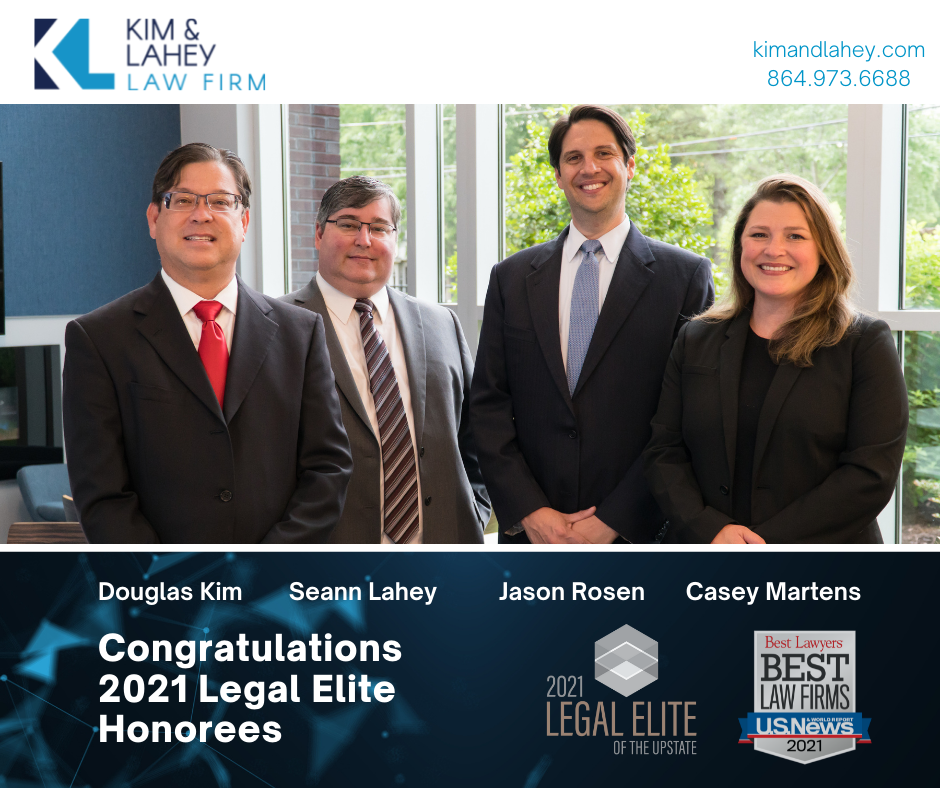
Kim & Lahey Attorneys Honored in 2021 Legal Elite
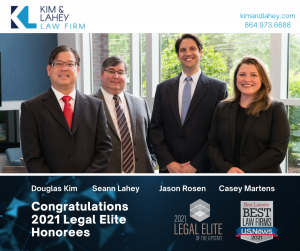
The Kim & Lahey Law Firm is proud to announce that our attorneys are being honored by Greenville Business Magazine as part of South Carolina’s 2021 Legal Elite. This is the second year in a row that all Kim & Lahey attorneys have made the list.
Greenville Business Magazine’s Legal Elite is the only regional awards program that allows every active attorney to nominate and vote for their peers across 26 categories. The following are the Kim & Lahey attorneys selected for inclusion, as well as the practice areas in which their work is recognized:
Douglas Kim: Intellectual Property and Innovation – Business Litigation
Seann Lahey: Intellectual Property and Innovation – Business Litigation
Jason Rosen: Tax and Estate Planning – Corporate Law, Mergers, and Acquisitions
Casey Martens: Labor and Employment
Thank you to all of our peers who voted and congratulations to all of the South Carolina attorneys who are being recognized this year.

Kim & Lahey Law Firm Named to “Best Law Firms” List 2021
Firms included in the 2021 Edition of U.S. News – Best Lawyers “Best Law Firms” are recognized for professional excellence with consistently impressive ratings from clients and peers. To be eligible for a ranking, a firm must first have a lawyer recognized in The Best Lawyers in America©, which recognizes the top 5% of private practicing lawyers in the United States. Achieving a tiered ranking signals a unique combination of quality law practice and breadth of legal expertise.
Since it was first published in 1983, Best Lawyers® has become universally regarded as the definitive guide to legal excellence. Best Lawyers lists are compiled based on an exhaustive peer-review evaluation. Almost 108,000 industry leading lawyers are eligible to vote (from around the world), and they have received over 13 million evaluations on the legal abilities of other lawyers based on their specific practice areas around the world. For the 2021 Edition of The Best Lawyers in America©, 9.4 million votes were analyzed, which resulted in more than 67,000 leading lawyers being included in the new edition. Lawyers are not required or allowed to pay a fee to be listed; therefore inclusion in Best Lawyers is considered a singular honor.

Doug Kim Shares Legal Strategies for Entrepreneurs
 The pandemic has forced many changes in the business world, from closings and layoffs for some, to successful pivots for others. One surprising outcome is the surge of new startups in America, which had increased by almost 50% for the year by October.
The pandemic has forced many changes in the business world, from closings and layoffs for some, to successful pivots for others. One surprising outcome is the surge of new startups in America, which had increased by almost 50% for the year by October.
To celebrate this renaissance, i4Series is hosting a free online event as part of Global Entrepreneurship Week on November 19 from 11am – 12pm. Whether you’re a startup or looking to scale your business, join us to learn about software and legal strategies that put you on a path to success.
Doug Kim has been supporting the entrepreneurship community for more than 20 years, helping innovative businesses of all sizes thrive. Now, more than ever, during this time of rapid innovation and uncertainty, entrepreneurs need legal strategies that empower them to succeed, strategies like protecting inventions and your brand, protecting your work from being copied, and using contracts to safeguard your interests to name a few.
He is joined by fellow speaker, Zac Muma, a Business Solutions Specialist for Microsoft. Zac works with entrepreneurs to identify what they need in their software stack and helps them get set up. With so many apps available, it’s hard to know which ones you may need and how they work together. Whether you’re B2B, eCommerce or offer professional services, Zac will show you ways to streamline operations and get new clients.

Doug Kim & Jason Rosen Selected to 2020 SC Super Lawyers® List
 We’re proud to announce that Doug Kim and Jason Rosen have been selected to the 2020 South Carolina Super Lawyers® list. Each year, no more than five percent of the lawyers in the state are selected by the research team at Super Lawyers® to receive this honor.
We’re proud to announce that Doug Kim and Jason Rosen have been selected to the 2020 South Carolina Super Lawyers® list. Each year, no more than five percent of the lawyers in the state are selected by the research team at Super Lawyers® to receive this honor.
Super Lawyers®, a Thomson Reuters business, is a rating service of outstanding lawyers from more than 70 practice areas who have attained a high degree of peer recognition and professional achievement.
The annual selections are made using a patented multiphase process that includes a statewide survey of lawyers, an independent research evaluation of candidates and peer reviews by practice area. The result is a credible, comprehensive and diverse listing of exceptional attorneys.
The Super Lawyers® lists are published nationwide in Super Lawyers® Magazines and in leading city and regional magazines and newspapers across the country. Super Lawyers Magazines also feature editorial profiles of attorneys who embody excellence in the practice of law. For more information about Super Lawyers®, visit SuperLawyers.com.

Kim & Lahey Law Firm Named to “Best Law Firms” List 2020
 Washington, D.C. – U.S. News & World Report and Best Lawyers, for the 10th consecutive year, collaboratively announce the release of the “Best Law Firms” rankings. This is the second time in less than two years that the Kim & Lahey Law Firm has been recognized for this honor.
Washington, D.C. – U.S. News & World Report and Best Lawyers, for the 10th consecutive year, collaboratively announce the release of the “Best Law Firms” rankings. This is the second time in less than two years that the Kim & Lahey Law Firm has been recognized for this honor.
Firms included in the 2020 Edition of U.S. News – Best Lawyers “Best Law Firms” are recognized for professional excellence with consistently impressive ratings from clients and peers. To be eligible for a ranking, a firm must first have a lawyer recognized in The Best Lawyers in America©, which recognizes the top 5% of private practicing lawyers in the United States. Achieving a tiered ranking signals a unique combination of quality law practice and breadth of legal expertise.
“Choosing the right law firm can be a vital decision,” said Tim Smart, executive editor at U.S. News & World Report. “The rankings draw on U.S. News’ 35 years of experience evaluating complex institutions to help individuals and companies alike make the best decisions.”
The 2020 rankings are based on the highest number of participating firms and client votes received on record. Almost 16,000 lawyers provided more than 1,229,000 law firm assessments, and more than 12,000 clients participated providing 107,000 evaluations.
“For the 2020 ‘Best Law Firms’ publication, the evaluation process has remained just as rigorous and discerning as it did when we first started ten years ago.” says Phil Greer, CEO of Best Lawyers. “This year we reviewed 14,931 law firms throughout the United States – across 75 national practice areas – and a total of 2,106 firms received a national law firm ranking. We are proud that the ‘Best Law Firms’ rankings continue to act as an indicator of excellence throughout the legal industry.”
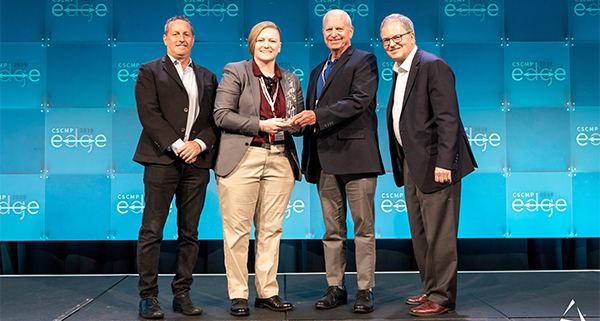
Using A.I. to Slash Shipping Costs | 2019 Supply Chain Innovation Award Winner
You’ve heard of SEO. How about SCO? It stands for Shipping Cost Optimization, a patent pending method of using artificial intelligence to slash shipping costs. This homegrown innovation, called IntelliPack, has thrust local entrepreneur, John Peck, CEO, President, & Co-Founder of FastFetch Corporation into the national spotlight.
Peck joined Katie Neau, RCI Supervisor of Snap-on Tools at the Council of Supply Chain Management Professionals’ (CSCMP) EDGE 2019 Conference on September 18, 2019, in Anaheim, California, for their presentation about “Using Artificial Intelligence to Slash Shipping Costs.” They beat out Silicon Valley giant Intel Corporation, as the winners of the 2019 Supply Chain Innovation Award (SCIA) .
Snap-on Tools is saving 11% annually on total shipping costs at its distribution center in Crystal Lake, IL. The initiative employs artificial intelligence to minimize wasted space in shipping cartons as well as new logistical processes to cut corrugated material costs by 20%, dunnage costs by 27% and packing labor costs by 30%. Peck says companies like Snap-on Tools often save an average of $18,000 per month on small parcel carrier shipping costs using his patent pending packing process.
It took Peck about six months to develop the new method. He says, “You have to be able to calculate the best box size for shipping an unpredictable collection of items of given sizes in less than a second. When someone orders online, that one order may have eight to 10 things in it. Each comes in different shapes and sizes and there are more than 100 boxes to choose from. Using the right size box is important.”
Doug Kim represents FastFetch. He says, “Because it’s our job to help with intellectual property protection, we get to see these inventions very early on. It’s exciting to see our clients be successful, to see an idea go from conception to commercialization.”
Peck’s method of using A.I. to slash shipping costs can virtually figure out how to place the items in the best sized box. “It’s going to make e-commerce affordable,” says Peck. “Consumers want free shipping, but someone has to pay for it. Our method ensures there is minimal wasted space. Smaller boxes means more packages can fit in each shipment. Instead of needing multiple trips, using multiple trucks or airplanes, now more can fit into each trip and that will help shipping companies become more efficient too.”
Congratulations to the entire FastFetch team! Watch the video below to see SCO in action.



